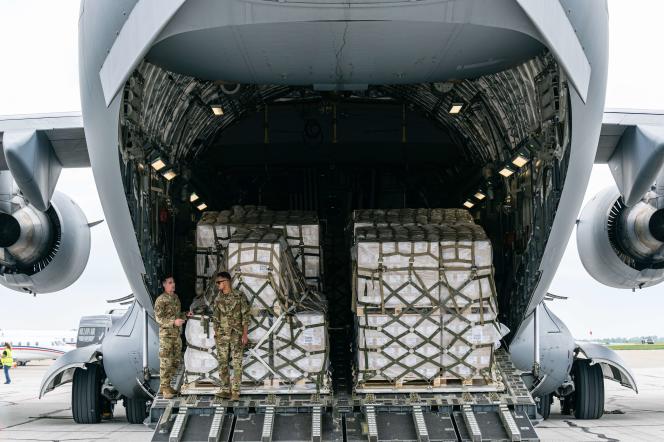A plane from Germany with more than 31 tons of boxes of baby milk powder intended for the American market, affected by a major shortage, landed on Sunday May 22 in the United States, according to images broadcast on American television channels. . President Joe Biden had earlier announced on Twitter that a plane “loaded with more than 70,000 pounds (over 31 tons) of formula is about to land in Indiana”.
“A flight left Ramstein Air Base in Germany last night, full of powdered baby milk,” White House economic adviser Brian Deese told CNN. On board, 132 pallets of Nestlé brand infant formula.
Mr. Biden indicated on Sunday evening that a second delivery was on its way to the United States. “We have secured a second flight to transport Nestlé’s special infant formula to Pennsylvania,” the president tweeted. “The flight and trucking will take place in the next few days, and I will continue to update you,” he added.
“Bring more competition”
Further powdered milk deliveries will “arrive early in the week” on other flights. The first shipment will cover about 15% of immediate needs, presidential economic adviser Brian Deese told CNN.
The United States has been experiencing a shortage of baby milk for several months, caused by supply and labor problems linked to Covid-19, then aggravated by the closure, in February, of a factory of the manufacturer Abbott in Michigan, after a product recall suspected of causing the deaths of two infants.
“We had a manufacturer who broke the rules and made formula that risked making babies sick,” said Brian Deese. But beyond that, asks Joe Biden’s main economic adviser, “how did we get to a market 90% controlled by three companies? »
He insisted on the need to think about how to “bring more competition into the economy” of the United States, “to have more suppliers of baby milk so that no company has such control over the chains of production. And we’re going to have to work on it.”
Furthermore, when asked about the likelihood that the United States will experience a recession in the coming months, Brian Deese was content to point out that “there are always risks”, but wanted to be reassuring about the solidity of the American economy. “There is no doubt the difficulties are great,” he acknowledged, citing in particular inflation, which slowed a little in April, to 8.3%, after reaching in March 8, 5%, its record for 40 years.


















